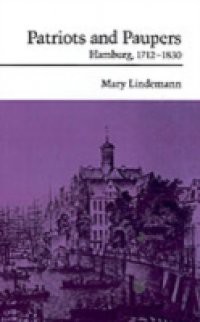Patriots and Paupers carefully analyzes a crucial juncture in the history of a great city: Hamburg's passage from the pre-modern into the modern world. Despite the relative wealth of historical literature on Reformation Germany and on Germany after unification, few English-language histories have addressed the events of the eighteenth and early nineteenth centuries. Mary Lindemann here details issues associated with poor relief--indigency, mendicancy, public health, labor regulation, social control, and disciplining--then uses these as springboards to broader historical debates. She draws out the subtle yet decisive political shift from the paternalistic dirigisme of a government of fathers and uncles to the socio-economic laissez-faire of early liberalism, and locates this political metamorphosis firmly within the framework of Hamburg's dynamic economic development and dramatic demographic growth. She links these political and social changes to the intellectual, cultural, and prosopographical contexts of the German Enlightenment. Far more than a history of poverty and social welfare policies, Patriots and Paupers explores the critical interconnections between economics, demographics, social change, and government in the closing years of the European Old Regime.

